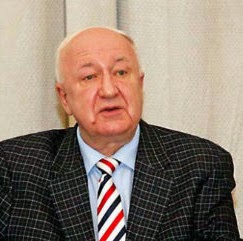| Ukrainian Prime Minister Arseniy Yatsenyuk (Photo Source : Web portal of Ukrainian Government) |
Said : Ukrainian Prime Minister Arseniy Yatsenyuk in an interview with Spiegel conducted by Matthias Schepp and Christoph Schult published on December 20, 2014.
The interview centered around Putin's aggression in eastern Ukraine, implementing the Minsk Protocol (the Ukraine ceasefire protocol-signed in Minsk-being monitored by the Organization for Security and Co-operation in Europe, OSCE), possibility of Ukraine joining the EU, Chancellor Angela Merkel's role in the Ukraine crisis, and host of other points including the US support.
The key points made by Ukrainian PM :
- Putin thought he could split the EU, but the opposite happened. Putin did not expect the kind of unity the US and the EU have shown.
- Putin's policies have turned him into a drug-addicted person. His survival depends on land grabs of foreign territories. He needs new annexations. The annexation of Crimea has gained him much applause at home. But that will not last forever.
- If 85 percent of Russians support the annexation of Crimea and the aggression against Ukraine, that is a very bad sign.
- Ukrainian youth wants to belong to Europe. (Joining) the EU remains our dream. We must not give it up. Otherwise Putin would win. His goal is to undermine the EU. This is not only about a conflict between Russia and Ukraine. Russia is fighting against the West and its values.
- (German Chancellor Angela) Merkel is a flagship of the EU. Not everything depends on her, but much does. I have been shocked in a positive way by how Merkel is defending international law so openly and strongly. She wants to have peace and stability in the EU, and she knows that Russia is a problem in terms of security.






